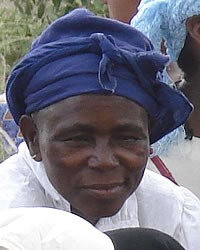Mijikenda, Duruma in Kenya

Photo Source:
Samson Njenga
|
Send Joshua Project a map of this people group.
|
| People Name: | Mijikenda, Duruma |
| Country: | Kenya |
| 10/40 Window: | No |
| Population: | 607,000 |
| World Population: | 607,000 |
| Primary Language: | Chiduruma |
| Primary Religion: | Christianity |
| Christian Adherents: | 65.00 % |
| Evangelicals: | 24.00 % |
| Scripture: | Complete Bible |
| Ministry Resources: | Yes |
| Jesus Film: | Yes |
| Audio Recordings: | Yes |
| People Cluster: | Bantu, East-Coastal |
| Affinity Bloc: | Sub-Saharan Peoples |
| Progress Level: |
|
Introduction / History
The Duruma Mijikendas live on the semi-arid plains, one mountain range inland from the seacoast of eastern Kenya. The large city of Mombasa is the closest place where Duruma may interact with other peoples.
What Are Their Lives Like?
Durumas are a mostly self-sufficient farming group with certain members becoming active traders with the outside world. All homesteads are members of one of 14 clans. Clan membership is determined by birth and not subject to change; the bride joins the husband's clan if differs from hers. Marriage within homesteads is discouraged but most marriages are within the 14 clans.
Each family unit is affiliated with one of the 14 clans. Males take care of families, and they control the farming. Males also hunt wild animals and herd their domestic animals (i.e. cattle, sheep, goats, and chickens). Boys help with this. Women do all household work assisted by girls and also do a great deal of the farming.
Land is owned by the clan, not by individuals. The sons inherit land from their fathers, including any goods or money they may have. Daughters do not receive any part of the inheritance.
Visitors can be initiated into one of the 14 clans of his own choice if they pay a subscribed fee to the panel of elders of that clan (normally a goat and a guard of liquor, which is equivalent to 20 liters). Such a visitor is even entitled to land of that clan and can even use the names of that clan in his family. But for the land he is given, he is not supposed to plant permanent crops like coconuts, cashews, mangoes, citrus fruits, and the like. After staying for a period of twenty years or more, such a visitor can be considered as one of the clansmen, but it will depend on the extent of respect and how he has lived peacefully with the clansmen who invited him.
What Are Their Beliefs?
The Mijikenda were originally idolaters who made sacrifices to their idol. Sacrifices included palm wine, porridge, and blood. They believed that the idols were representatives of the living dead; therefore, they would name the idols after one of their ancestors. They would sacrifice to these wooden images whenever trouble came to their families.
Today, many Duruma Mijikendas are Christian, although their ethnic religion remains strong. It's difficult for Mijikenda Christians to completely abandon their ancestral practices.
What Are Their Needs?
Duruma Mijikendas need educational opportunities and adequate medical care.
Prayer Points
Pray for the Duruma Mijikendas to give themselves entirely to Christ and live in the power of the Holy Spirit.
Pray for the breaking of ancestral curses.
Pray for the Lord to make an example of the Duruma Mijikendas by blessing them spiritually and economically. They can show others what God can do for those who submit to Christ.